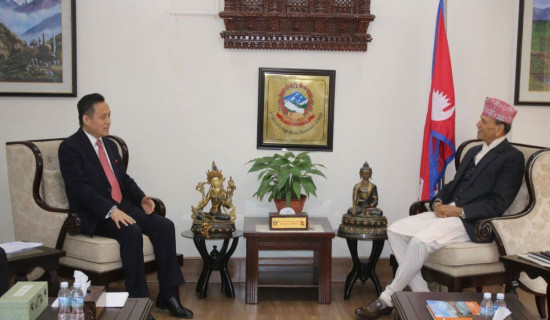- Thursday, 26 February 2026
Delayed Transitional Justice
Nineteen years after the signing of the Comprehensive Peace Agreement (CPA) between the government and the then Maoist rebels, conflict victims are still awaiting justice. The situation is especially dire for the families whose loved ones went missing in the decade-long conflict and whose whereabouts remain unknown. Many such families have been demanding the truth. According to the CPA, all works related to transitional justice should have been completed within 60 days of the signing of the agreement. However, many of the works are still pending. The only visible progress made in the CPA is the management of Maoist combatants.
Although the top leaders of the parties that signed or witnessed the signing of the CPA have led governments in the past, they did not act in accordance with the spirit of the CPA. Instead, they used the CPA as a bargaining tool to gain or retain power. As a result, the home-grown peace process model has failed to deliver truth to families of the disappeared, and provide justice and reparations to those who suffered during the decade-long conflict. When the country marked the completion of 19 years of the CPA signing on Friday, a group of conflict victims staged a sit-in in Kathmandu demanding justice, while the Advocacy Forum and the National Human Rights Commission, as usual, urged the interim government to reconsider its strategies regarding the Transitional Justice.
The Advocacy Forum Nepal has urged to correct the flawed selection process for commissioners after the government doubled down by endorsing regulations and budgets for commissions whose legitimacy remains in question. It said many commissioners appointed last year were selected without transparency and without meaningful participation of victims, undermining both credibility and public trust. This is not a technical misstep; it is a political choice that risks entrenching impunity. Likewise, the National Human Rights Commission, in a statement, has reminded the government of its unfulfilled promises under the CPA.
The state had committed to publishing the list of those killed or disappeared within 60 days of the agreement, but two decades later, conflict-era families are still waiting for the truth about their loved ones. Similarly, repeated failures to establish an effective Truth and Reconciliation Commission have left wounds unaddressed and accountability absent. It said the victims monitored across provinces were found frustrated more after the Gen-Z movement. Obviously, the movement has altered the political course that had been in place since the CPA signing. It not only overthrew the government of the parties that were leading the government in turns over the years, but also sent a message that the party leadership could not deliver as per people's aspirations.
Fearing that their demands would be in shadows in the new political context, the conflict victims have taken to the streets once again. Their demand is straightforward: the resignation of commissioners who they believe do not represent them, and the reconstitution of the transitional justice bodies through an inclusive, consultative process. As the interim government is free from giving political protection to anyone, it can take straight forward move to conclude the peace process by appointing the right persons in the two TJ commissions. This is why the conflict victims have staged the sit-in again.
Now when 19 years have elapsed since the CPA, the victims may not be waiting longer to know the fate of their missing family members. Thus, the government, whose primary focus is holding elections in March 2026, should also facilitate for the early conclusion of peace process by providing justice to all conflict victims. A nation cannot move forward while ignoring the wounds of its past.







-square-thumb.jpg)





-original-thumb.jpg)


